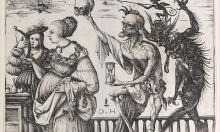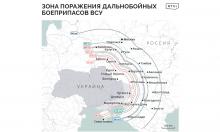Russia Welcomes Foreign Investment - 27 March, 2003
This March the Swedish concern Modern Times Group (MTG) won a Press Ministry contest for the decimeter frequency of the DTV channel. Today the concern owns 75% of the channel's stock. Why has Russia been chosen for investment in the media business?

The Russian television advertising market is the fastest growing in the world. It grew by 76% in 2002, and Russia's economy has entered its fourth year of vibrant economic growth.
Also, Russia has the largest number of households with televisions in Europe. In all, this is an extremely positive landscape for MTG.
We have long been a pioneer, beginning in our home market, where we launched Sweden's first commercial broadcaster, TV3, and we have never looked back. We have built a strong business in the Baltics with both free and pay-TV and we have enjoyed very positive results thus far with DTV and our investment in StoryFirst, the majority owner of CTC.
MTG's Strix production company has been an innovator in developing successful Reality-TV formats and bringing them to local television markets, including such hit series as 'Robinson', 'Bar', the 'Farm' and others. We see considerable potential for developing strong reality television brands on the Russian market.
Could you tell us in brief about the MTG concern? What does the Russian aspect of its activities include?
MTG (Modern Times Group) is a leading international media group with broadcasting, production, publishing and media services businesses, operating in more than 30 countries around the world. MTG is the largest Free- and Pay-TV operator in the Nordic and Baltic region, and also has Free-TV operations in Russia and Hungary. MTG is the largest commercial radio broadcaster in Northern Europe, the global market leader in DVD subtitling and dubbing, and a leading international Reality-TV production house. Our shares are traded on the Stockholm and Nasdaq stock exchanges.
MTG directly or indirectly controls 75% of DTV and has a 37% share in StoryFirst Communications, which owns the majority stake in CTC, the third largest commercial TV network in Russia. At DTV we have turned around and re-launched the channel under a new programming format. In addition, our investment included building an additional 11 transmitters in the regions, and upgrading two others.
Just this month, the Modern Times Group launched the premium pay-TV channel TV1000 in Russia, the Baltics as well as the Western CIS states of Moldavia, Belorussia and Georgia. TV1000 broadcasts 24 hours a day and features blockbuster movies including international titles such as 'Good Will Hunting' and 'Jackie Brown', and local box office hits such as 'The Brother', 'House of Fools' and 'The Cuckoo'. The channel incorporates both local language subtitling by the MTG company, SDI Media, the world market leader in subtitling services, as well a dual Russian and English language dubbed audio track.
According to the results of the recent contest, the creative concept of the DTV ("seven subject channels in one") was recognized as the best option. What is it all about?
We implemented our new format, "Seven channels in one" on DTV in the beginning of February, even before the license tender.
We did this to demonstrate our ability, not only to design an interesting concept, but to implement the concept successfully on the airwaves. In essence, the viewer can watch not just one, but seven new specialised television channels on DTV over the week.
For example, every Monday is 'European Channel,' featuring historical serials and thematic programming on European countries. Thursday is 'Real World' featuring reality television, detective series and programmes about the activities of the army and special services. Friday features 'World of Adventures' including programs about nature and travel, and so on. In addition, throughout the week there are such popular series as the hit American comedy, 'Married with Children' and our own series, as well as popular Russian and international films.
You have stated more than once that there will be no politics on DTV. But one cannot ignore the fact that Russian TV viewers, especially those of advanced age, closely watch political developments here and abroad.
Yes, politics will not be featured on DTV, and this is a point of principle for MTG. There is no shortage of politics and news on Russian TV, and the federal channels feature several hours of news programming each day. We have re-branded DTV as 'different television', providing programming that is not available on other Russian television stations. This is the role of a broadcaster such as DTV in Russia, and one reason we succeeded in the license tender was because we demonstrated we could fill a real gap in the television market. Our mission at DTV is to provide high quality entertainment, drawing from the best Russian and international programming content.
What, in your view, are the main differences between the Russian TV business and that of the West?
The Russian television business has experienced a very different history and developed along different lines from the television business in Western Europe or North America.
That being said, there are some important similarities:
First of all, as in the West, televisions can be found in virtually every household. As in North America, there are national television networks and local broadcasters and affiliates. Russia is a large, multi-ethnic country and television tastes vary according to cultural values and traditions. Given Russia's vast size, the number of stations available to viewers varies widely by region, therefore investment in infrastructure is important in order to reach the widest possible audience. Russian television is also widely watched in the CIS and Baltic countries, where there are large Russian speaking populations.
The nature of the market has been affected by economic instability in previous years, and, of course, the state continues to play a major role. With recent economic growth, however, we are seeing the emergence of a dynamic advertising market, and we think that success will increasingly depend on delivering high ratings through creative original and imported programming - as in the West.
According to MTG president Hans Holger Albrecht, the company is going to do serious work in Russia for a long time. What will it actually do?
Even before our license was renewed earlier this month, MTG made clear that it was making a long-term commitment to the Russian market. We have a very optimistic view of the development of MTG's Russian business. We plan to make significant investments in the coming years, in addition to the amount we have currently invested (our latest is in the pay-TV channel TV1000). The Russian television advertising market has enjoyed dynamic growth and we have a very positive view of Russia's long-term growth potential. We believe we have already achieved real success bringing our business model to the Russian market and see great growth potential in the Russian media sector in the future.
It is no secret that some foreign businessmen think that investing in Russia is a risk. Do you share this view? Can you, judging by your own experience, say that it is profitable to invest in Russia's economy, specifically in the media business?
Let us take DTV as an example. When we bought our share of DTV, the channel was on the verge of bankruptcy. We overhauled the station, not just the programming, but also how the station was run as a business. By the fourth quarter of 2002, the average viewing share of the station had increased three times, compared to the same period in 2001. When we were put in the position of renewing our license, we proved successful on the merits of our track record and an innovative programming concept. We think this sends very positive signals to foreign investors that their investments will be respected. This is very important.
In terms of Russia's media business, there is enormous potential, and we are already seeing positive results. This is good not only for investors but for Russia as well, as our investment will provide Russian viewers with greater choice and quality of programming. We have made clear our plans to invest in domestic production of high quality programming. At DTV, we have invested in the broadcasting infrastructure, building and upgrading transmitters. The TV1000 launch demonstrates the great potential for Russian and local language pay satellite broadcasting, not just in the Russian Federation, but throughout the CIS and the Baltics. We have already seen this potential borne out, as StoryFirst and CTC have achieved profitability, and we have enjoyed profit growth in the Baltics.
Looking at the broader perspective, local and foreign investors have been encouraged by President Putin's commitment to reform and cutting red tape. The Russian government is committed to creating an environment for long-term growth and creating many of the pre-requisites needed to give investors confidence. There is also a real dialogue between the government and foreign business leaders. We see this as proof of real commitment and remain optimistic about Russia's long-term potential as a market.
Subscribe to Pravda.Ru Telegram channel, Facebook, RSS!




